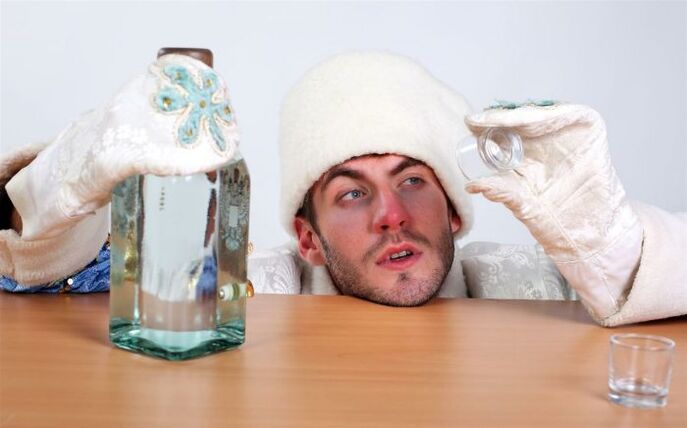Alcoholism is one of the most discussed topics. This endangers family relationships and society as a whole. Isn’t it surprising that after a while the patient’s relatives wonder how to make a person stop drinking?
Reasons for alcohol addiction
Before you understand how to help a person stop drinking, you need to understand why he is drinking. By isolating the root cause, you have a better chance of curing the person’s beliefs. More often, the onset of alcoholism is a psychological addiction, so it is important to help a person understand that it is an addiction, not a habit. In most cases, there are four reasons why people start drinking:
- for the company;
- stress relief;
- boredom;
- out of habit.
A popular reason why a person begins to suffer from alcoholism is drinking for the company. Being the only friend among friends, it’s hard to keep a firm stance. Some, especially teenagers, are honored to support the company in the endeavor.

When a person is not surrounded by a long environment and constant problems at work, he starts drinking alcohol in order to get rid of this stressful pressure. When you drink strong feelings, negative emotions, for a moment it may seem that the problem does not exist. In fact, it won’t go anywhere if you don’t decide on it. As a result, the possible exit in such a situation must be closed. As soon as the intoxication passes, the person plunges back into negative emotions, concluding that, in order to avoid them, one should not stop drinking.
Drinking out of boredom is a loose term. This is not a short-term situation in which a person has nothing to do. We are talking about a long period of time during which a person is faced with a situation that does not allow him to use force, to focus on something specific. More often in this state, a mechanism is activated that helps to reconcile with oneself.
The most dangerous reason why it is difficult to answer the question of how to help an alcoholic to stop drinking is common alcoholism. In this case, it is difficult for a person not to drink, because the habit has become his daily routine and it is already difficult to imagine his life without it. In this case, the motivation to stop drinking must be very serious, because otherwise it is almost impossible to convince a person to stop drinking alcohol.

It is often very difficult to single out any cause of addiction. It’s all closely intertwined and works together. When alcoholism reaches its final stage, then we are talking about a physical craving for alcohol. In this case, help against alcoholism without medication is impossible. If a person wants to get rid of the disease on their own, it will be of great help in further treatment.
Does persuasion work?
How to make an alcoholic heal? In fact, there are many ways to discourage a person from drinking. The most popular way is to convince a person to stop drinking alcohol. This is a softer way to help him.
You can leave an alcoholic in more radical ways - this is a nervous shock after drinking. This segment also includes intimidation of the patient. The third sector of aid is the addition of various medicines or folk remedies to food. Before you figure out how to help a person who drinks stop drinking, it’s worth finding out what form of alcoholism will lie, what that person has become addicted to.

Since adding some medicinal or folk remedies to food is a very radical method that requires caution and prior consultation with a doctor, it is worth starting with milder methods, especially you need to help the alcoholic in conversations.
During these conversations, it is worth trying to get the person to stop drinking alcohol. The most effective ways to persuade an alcoholic to be treated will be in the first stage of alcoholism, when the person has not yet lost the ability to critically perceive reality.
Before you start a conversation, think about the facts you are going to tell the alcoholic. If he sees how awful he looks from the side while drunk, maybe that will encourage him to make radical decisions. He may already want to leave himself, but willpower doesn’t allow it for lack of a "really important" reason.
How to convince an alcoholic of the harmfulness of his habit? It is best to gather family or friendly advice. Only those closest to the person you trust should be in the circle in this conversation. In the first phase, it is easy to wean a person from alcohol. All you have to do is tell him about his drunken behavior, show him a tape from a recent party. If a person has not yet lost the ability to think adequately, he will be frightened and ashamed of his behavior, thus stopping drinking.

It would be nice to remind you of a hangover, especially when it doesn’t allow you to spend time with your family or the way a sick person likes it. It is important that every habit must be maintained, which means spending money on it. Calculate by expressing them in movie trips, children’s rides, and other activities.
It is important to prepare in advance for the fact that your attempts to figure out how to stop drinking will be experienced with hostility, resentment and quarrels. In this case, it is very important to remember the answer to the question. Is it possible to cry or, on the contrary, to freely agree to the conditions the patient is exposed to? By no means. It is better to explain in a calm voice that no one will force anyone, but why not pay attention to the available alternatives.
If you have managed to move away from the theory of how to convince a person to be treated for certain results, in no case do not leave him in such a situation. Keep supporting, maybe he himself doesn’t know how to get rid of the addiction. Not everyone can stop drinking at home. Find a suitable clinic, make an appointment with a doctor, help the person get to her. A person who stops drinking needs help more than ever.
Other options
One of the undesirable uses is intimidation, if you think about how to help, stopping drinking is so difficult, and there is additional stress. It must be understood that this technique of work can lead to the opposite effect.
This method is suitable only for those patients who correspond to a certain psychotype. Some may experience this behavior aggressively, which is clearly not the best reaction.
Persuasions, arguments, intimidation do not always work. Sometimes that is not enough if the alcoholism has already passed into a deeper phase. In this case, you must use special medications. These can be ordinary medicines or something from folk recipes.
With the help of industrial pharmacology drugs it is possible to create a feeling of aversion to alcohol in a person who drinks. Such methods are available even if a person does not know that he accepts them, although the desire to get rid of the addiction directly helps to achieve more.

Drugs are added to alcohol or food. This often leads to a deterioration in well-being immediately after consuming alcohol. After several such cases, the alcoholic begins to associate the bad condition with alcohol and think about stopping drinking.
Medicines used for these purposes contain disulfiram or cyanamide. Therefore, the body cannot normally process ethyl alcohol. There is an accumulation of decomposition products in the blood, which becomes a cause of permanent intoxication.
During this therapy, as soon as you notice the effect of the medication, it is a good idea to have another conversation, asking the alcoholic to go for treatment. It is important to describe the benefits of hospital treatment:
- recurrence prevention;
- psychological help;
- constant monitoring of health status;
- restoration of internal damage.
The best way to get rid of addiction is treatment in a hospital, where the patient will be constantly monitored by a narcologist. The lowest number of relapses is observed with this treatment.
Stages of alcoholism
Alcoholism is usually divided into three phases, each of which assumes specific symptoms and numerous health consequences. The first stage is more difficult in terms of recognizing the problem by the person’s appearance. Unaware of himself and the people around him, a person gradually increases the dose of what he drinks, as a certain experience is gained, which does not allow him to achieve the desired degree of intoxication with the same doses of alcohol.
Already in such a state a person is not able to stop and stop drinking unless he is told of the corresponding problem. After a person drinks, he begins to suffer from nausea and vomiting. Very often, the patient has memory disorders, he cannot remember what he did last night. Memory loss is partial.

As a result, after the first phase of alcoholism, a person faces a constant increase in alcohol consumption. At the same time, the drink can be repeated two or three times a week. The problem in this case is the lack of care for the loved one, and as a consequence the worsening of the addiction.
When a person enters the second stage of alcoholism, the external signs become more noticeable. The first drunks who appear, when a person drinks alcohol without a break for even two or three days, speak of the development of second-degree alcoholism. At this point, a physical form of addiction begins to form.
The person starts to hangover because it is the only way to alleviate the condition. Such symptoms are clear signs of the second stage of the disease. In addition, the person suffers from constant weakness, headache, dizziness, nausea, sweating. Unpleasant tremor begins to permeate the entire body, primarily expressed on the hands. The second phase can last for years, up to two decades, but can be limited to two years. In the final stage of the second stage, the person no longer has the opportunity to deal with the problem on their own, only a doctor will help.
The last stage is the third. When it forms, anyone can see a person as an alcoholic. The look is starting to change. The person has a constantly swollen face, alcohol smells a kilometer away. By that time, many chronic diseases develop, severe psychoses and other problems manifest. In such a state, people are usually already left without a family or are surrounded by people in the same country. In the third phase of alcoholism, a person loses his social position, the ability to think critically. A return to normal life in this case is unlikely.
























